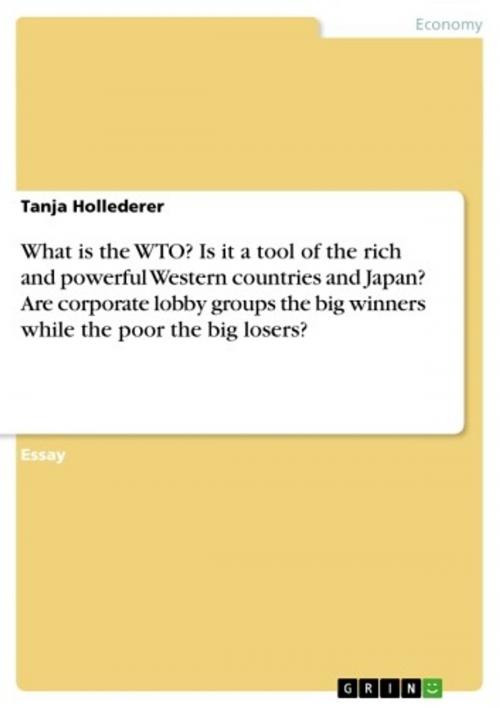What is the WTO? Is it a tool of the rich and powerful Western countries and Japan? Are corporate lobby groups the big winners while the poor the big losers?
Business & Finance, Economics, International| Author: | Tanja Hollederer | ISBN: | 9783638418621 |
| Publisher: | GRIN Publishing | Publication: | September 16, 2005 |
| Imprint: | GRIN Publishing | Language: | English |
| Author: | Tanja Hollederer |
| ISBN: | 9783638418621 |
| Publisher: | GRIN Publishing |
| Publication: | September 16, 2005 |
| Imprint: | GRIN Publishing |
| Language: | English |
Essay from the year 2005 in the subject Economics - International Economic Relations, grade: High Distinction, University of New England (Australia), 12 entries in the bibliography, language: English, abstract: Trade is as old as mankind and with mankind it developed and kept growing into a jungle of arrangements, contracts, and trade relations summarised by the catch phrase globalisation. Everyone agrees that there have to be rules to form a common foundation for international trade around the world, so that all countries which use it as 'an instrument for promoting development'1 will profit from its many benefits. The World Trade Organisation (WTO) is the nations' solution to the problem of ensuring free and fair trade in the interest of economic development of the world as a whole. Keeping this in mind, one might wonder why since 1999 a movement called antiglobalisation wins more and more followers seeing the WTO as their declared enemy2. Calls for an abolishment of the system grow louder and louder and the dissatisfaction amongst the more than two thirds of developing member countries shows in the debacle of Seattle where African ministers simply walked out or the collapse of trade talks in Cancun. Has the WTO really developed into a mere tool of the rich and powerful Western countries and Japan and are corporate lobby groups the big winners, while the poor the big losers? This question forms the centre of the following explanations, which shortly outline the original idea behind the WTO, then concentrate on the problems of implementing this idea, and finally answer the question in a conclusion. Due to the limitations of this essay it is not possible to cover everything associated with the WTO. The texts indicated as footnotes should be considered for further exploration. 1 Nitya Nanda, WTO and Development, It's all about a mercantilist game. From: http://www.gdnet.org/ 2 See The Guardian/Action Aid, TRADE: An insight into the way the world does business, 8 September 2003; p. 3.
Essay from the year 2005 in the subject Economics - International Economic Relations, grade: High Distinction, University of New England (Australia), 12 entries in the bibliography, language: English, abstract: Trade is as old as mankind and with mankind it developed and kept growing into a jungle of arrangements, contracts, and trade relations summarised by the catch phrase globalisation. Everyone agrees that there have to be rules to form a common foundation for international trade around the world, so that all countries which use it as 'an instrument for promoting development'1 will profit from its many benefits. The World Trade Organisation (WTO) is the nations' solution to the problem of ensuring free and fair trade in the interest of economic development of the world as a whole. Keeping this in mind, one might wonder why since 1999 a movement called antiglobalisation wins more and more followers seeing the WTO as their declared enemy2. Calls for an abolishment of the system grow louder and louder and the dissatisfaction amongst the more than two thirds of developing member countries shows in the debacle of Seattle where African ministers simply walked out or the collapse of trade talks in Cancun. Has the WTO really developed into a mere tool of the rich and powerful Western countries and Japan and are corporate lobby groups the big winners, while the poor the big losers? This question forms the centre of the following explanations, which shortly outline the original idea behind the WTO, then concentrate on the problems of implementing this idea, and finally answer the question in a conclusion. Due to the limitations of this essay it is not possible to cover everything associated with the WTO. The texts indicated as footnotes should be considered for further exploration. 1 Nitya Nanda, WTO and Development, It's all about a mercantilist game. From: http://www.gdnet.org/ 2 See The Guardian/Action Aid, TRADE: An insight into the way the world does business, 8 September 2003; p. 3.















